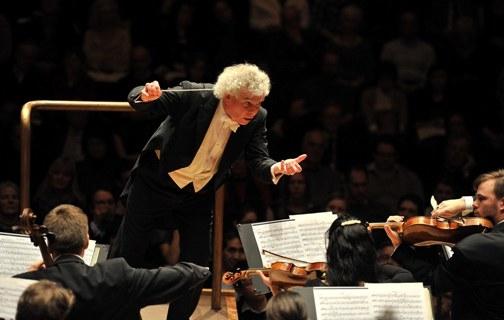Sir Simon Rattle's clever programming struck again last night, showing us that musical neoclassicism - for want of a better word, which would be something like neo-everything - didn't begin with Stravinsky, whose Apollo ballet is surely his most elevated set of gestures to the past. Tchaikovsky, the rococo twiddles of whose complete Nutcracker this team seems to have enjoyed so much on a recent recording, would probably take the palm, though Mahler, of all composers, will do, too. At least, his Fourth Symphony begins that way. And soon there was more music not of this world to match Stravinsky's, which I have to admit only the Berlin Philharmonic strings can really play like this.
The moments of secret rapture, usually contrasted with their thunderous opposite, just kept on coming. I did fret at first that the Karajan-sized string orchestra for Apollo, freighted by eight double-basses lined up centre-back, would pin the god's wings, dressing him up in exquisite tailoring when we wanted to see the gleam of a perfect six-pack (perhaps I'd have to close my eyes and think of Balanchine's ineffable choreography). But what Rattle may have sacrificed in muscle-tone and mobility he gained in a perfection that was not without its playfulness. Blues and ragtime broke the poised surface; Bach, Tchaikovsky and Delibes were allowed their turn in the well-tempered string of dances. Just when your eyes were ready to prick at the sheer elusive grace of the Pas de deux's cello refrain - who said Stravinsky couldn't write a good, tuneful phrase to call his own? - we were off into resonant leaps and bounds.
Apollo's apotheosis, with its quick fade into infinity, would connect with the end of the Mahler. Which begins with a classically-proportioned journey that already wants to break its bounds. No, the clash of sleigh-ride tempo and strings launching into their Haydn trot wasn't a mistake (there were a few smudges later on, but only perhaps because Rattle is becoming as volatile as Abbado in his old age). There was so much to smile at before the woodwind got rough in a feral development with a superbly well-judged climax (scary). The grotesquerie of Friend Death striking up his fiddle in the scherzo- Daishin Kashimoto as evocative as he had been in striking the sun-god's lyre - was offset by its dreamy context, inner string parts snapping unpredicatably from time to time out of the spell they'd cast. Chamber-musical interplay always sounds better, it seems, when you can see the increasingly younger players looking and listening to each other.
And what a change seems to have come over Rattle in his relationship with the orchestra. Maybe that Nutcracker really did loosen them all up, perhaps it got them to enjoy high-level play - or perhaps they've been taking note of what goes on in Lucerne with Abbado (some of the players go there in the summer). At any rate, this Mahler slow movement was the most natural I've heard from the partnership. Once again, I have to leave reservations behind and admit that no-one lights up the heavenly way from inside like the Berlin cellos. Mahler's agony of bitter experience came across as sharp and dissonant, the fairground variation just delicious in its slides and shrieks. Again, the big boys (and girls, though still not enough of them) are enjoying what they do.
The biggest surprise of all was to find Christine Schäfer, so down-in-the-mouth and shortwinded a finale singer for Jurowski and the LPO earlier this season, transformed for her redemptive role. This time I didn't mind her coming on in the blaze of light just before the end of the poco adagio - no queenly ballgown as before, only a modest number to accentuate the gamin quality - nor the musical breaths she took in what should have been the longer phrases (though I still think that the previous evening's soloist, young Anna Prohaska, could have dealt with those better). But she very much meant what she sang, and despite a few potentially dangerous moments of not-quite-togetherness, came to rest at one with the rocking strings of the final verse (oh, that clarinet entry into the silence - another of the evening's truly unforgettable touches). Another of those stillnesses followed which London audiences seem all too ready to abet. And though I wasn't going to put myself out to hear the Mahler Third on Wednesday - while admitting that only Abbado does it better than Rattle's City of Birmingham Symphony Orchestra recording - I'm desperate to hear it now. I repeat, along with the text of Mahler's celestial song: such music-making is not of this world.













Add comment